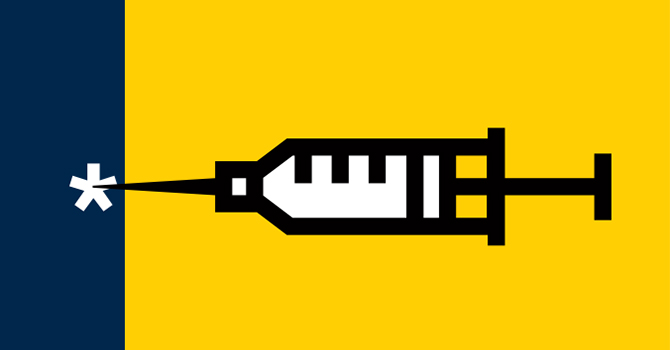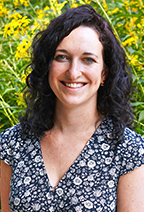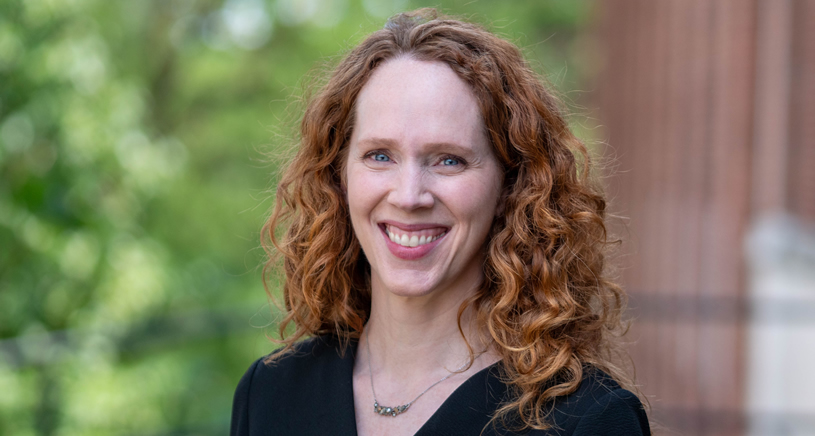Invisible Impact: How Vaccines Seem to Make Diseases Disappear

When public health is working, nothing happens; people don't get sick or hurt or die, and in a way, public health, at it's very best, is invisible. This week, we're talking about one function of public health that embodies that idea — vaccines. When vaccination works the way it's intended to, nothing happens, diseases like polio seem to disappear. But are they really gone or is it just public health at work?
Listen in as experts from the University of Michigan School of Public Health and the University of Michigan School of Information discuss the threat of vaccine-preventable diseases, how vaccines work, what makes people choose not to get vaccinated and why vaccines are important for both children and adults.
Listen to "Invisible Impact: How Vaccines Seem to Make Diseases Disappear" on Spreaker.
|
Subscribe and listen to Population Healthy on Apple Podcasts, Spotify, Google Podcasts, iHeartRadio, YouTube or wherever you listen to podcasts! Be sure to follow us at @umichsph on Twitter, Instagram, and Facebook, so you can share your perspectives on the issues we discussed, learn more from Michigan Public Health experts, and share episodes of the podcast with your friends on social media. |
00:02 Narrator: The Director of Computing at the University of Michigan School of Information is a man named Charles Yun. We start today on Population Healthy with a story of his that's nearly 20 years old but with lessons that are lasting.
00:17 Charles Yun: So we are now almost 20 years out from the Y2K event, from the year 2000. But it was actually, probably about three, four years prior to the year 2000 where people realized, "Oh, we have a problem." People started using computers, you know, in the '60s, and it started getting popular in the '80s, and they took a lot of shortcuts, because the capacity and the capability of computers back then was not what it is today. So when they started storing the year, they did what was very common when you're writing by hand, you just use the last two digits, so you wrote '89, '90, '91 and you dropped the 19. And when the year 2000 rolled around, they realized, "Oh, if you write '00, what does that mean? Is it the year 1900, or is it the year 2000? And computers make a lot of calculations based on that date. This wasn't just a small problem, it was a problem that affected everything. There were things as silly as automatically setting the date on a watch, where that's just started to break. But the more frightening prospects were in the financial industry and in healthcare insurance, for example, or air traffic control where airplanes would say, "Oh, if we don't know what day it is, we're going to put in, maybe garbage data or the computers may just stop working.
01:25 CY: There was a great deal of public fear. So if you were alive back then, a lot of the New Year's parties, you know, they sort of stood around with flashlights and coolers full of food just in case everything went south, because the power infrastructure, it was unclear whether or not that would maintain itself, if you would get power to your home. Luckily, there were people that were working on this behind the scenes, and they were frantically changing code, the software code that people work on on the computers. Programmers were working on all of these things behind the scenes for the three, four years leading up to it, spending inordinate amount of time, just huge chunks of time in the background. And by the time the year 2000 rolled through, nothing happened. The most amazing thing was that people said "Oh, you made all of this up. There's all of this hype that you guys made us worry about, and fear of the end of the world, and nothing happened." One of the biggest compliments you can give to the entire field of IT is if you don't notice it, it means that we're doing our job right. So all of that initial investment and that upfront preparation prevented this massive set of cataclysmic problems that might have happened, but they did the work upfront.
02:36 Narrator: Nothing happened. And this story is about IT and computer science, but it really speaks to the core of population health. When public health is working, nothing happens; people don't get sick or hurt or die, and in a way, public health, at it's very best, is invisible. Hello and welcome to Population Healthy, a podcast from the University of Michigan School of Public Health. Today, we're going to talk about one function of public health that embodies that idea, vaccines. When vaccination works the way it's intended to, nothing happens, diseases like polio seem to disappear. But are they really gone or is it just public health at work?
03:17 Nina Masters: I'm Nina Masters. I'm a PhD student in Epidemiology at Michigan Public Health. My research specifically focuses on infectious diseases, and I'm really looking, mostly, at vaccine-preventable disease and how they are transmitted. I'm very aware, and I know that most people are not very aware in their day-to-day life, that being born in 1992, like I was, that that means that I didn't have to worry about polio, and I don't have to see measles every day, and I don't have to worry about smallpox, or a lot of these diseases that were a very big public health concern even for my parents. And I think that vaccines, they're really waging an uphill battle, because they are a victim of their own success.
03:57 NM: And the more that you don't see these diseases, the more you're not worried about them. And then the personal risk calculation of, "Oh, well, I might have a sore arm," or, "It might get red," or, "It might hurt to get this vaccine," becomes a tit-for-tat calculation with, "What's the real chance I'll get polio in New York or in Michigan?" And yeah, it's a really slim chance, but that's not what the calculation should be. But I think people don't realize what the threat is that they're facing, because they don't see it anymore. During my senior year at Princeton, we had a meningitis outbreak which was kind of a very formative and scary experience for me. We had, I believe, eight or nine cases at Princeton, some of which ended in some pretty long-term consequences; like there was an amputation, deafness, and then a girl at Drexel who had had contact with a Princeton student actually died of meningitis that he had been carrying in. So it was just kind of this wake up call for me about the fact that these diseases exist and that you do need vaccines, in some instances, in a very clear-cut way to kind of shut down an ongoing outbreak.
05:08 Narrator: Before we dig any deeper, let's get a quick refresher on what vaccines are and how they work. We talked to Matthew Boulton, Senior Associate Dean for Global Public Health at the University of Michigan School of Public Health to learn more.
05:22 Matthew Boulton: Vaccines basically work by fooling the body into thinking it's been exposed to disease. So for example, when we immunize somebody with the Hepatitis B vaccine, it makes the body or tricks the body into thinking that it's been exposed to disease, and therefore provides protection in the future against acquisition of disease. For many of us born in the late 1950s, we were the last generation that was exposed to lots of vaccine-preventable diseases, because vaccines weren't in widespread use among the population. So I had measles, mumps, rubella, pertussis, I had Haemophilus Influenza type B, I had pneumococcal pneumonia, all of which now have effective vaccines available to them. There are quite a number of vaccines on the schedule that provide protection against about 16 diseases in the United States, and the basic division that we recognize with regard to vaccines in the US are the inactivated vaccines, so the basically dead vaccines versus the live attenuated. So, the live attenuated vaccines are vaccines that have been weakened, but in fact are alive. So, they reproduce in the body and induce immunity that way. Now, each of those vaccines have advantages and disadvantages associated with them. As a general rule, the closer that a vaccine is to natural disease, the better the immunity it provides. So quite naturally, live vaccines provide somewhat better quality and longer lasting immunity than do killed vaccines.
07:08 MB: One, the newer classes of vaccines, or what we refer to as the recombinant vaccines, which basically are using genetic engineering to formulate the vaccine. So, a couple of examples of that would be the hepatitis B vaccine. Newer ones would be the human papillomavirus vaccine, so the HPV vaccine, and the malaria vaccine that's recently out on the market. One of the drawbacks of live attenuated vaccines is that in fact you're injecting live pathogen that's been weakened through a number of different methodologies, and in fact of matter in rare circumstances individuals may actually develop disease. Typically we see that happen in individuals who are immunocompromised, so their immune system is not operating normally and it permits the pathogen to undergo uncontrolled replication and result in disease.
08:09 Narrator: So that was one of the big concerns with the live polio vaccine, the so-called OPV or oral polio vaccine, which was a live formulation versus the IPV, which was the inactivated polio vaccine. The reason that we made the switch from the OPV in the United States, the live vaccine to the inactivated was because of what we called Vaccine-associated paralytic polio, very rare occurrence at about one per 5 million administered doses, and was more common again in individuals who are immunocompromised. So these tend to be very rare occurrences, but they attract disproportioned attention from the media and the public and the perception then becomes that if you get this vaccine it can cause the disease, when in fact of matter these are exceptionally rare occurrences. People would say, "I got the flu vaccine, and then I got the flu." When in fact of matter most flu formulations have been inactivated and therefore, it's impossible to acquire influenza from those vaccines.
[music]
09:27 Narrator: Vaccines don't just help the recipient, there's a compounding benefit to the community.
09:32 NM: You can really think of herd immunity is this idea where if enough people get vaccinated you're gonna end up protecting everybody. And that doesn't make a lot of sense necessarily, but the idea is that a lot of diseases, the pathogen, the bacteria, the virus, it needs to jump from person to person to stay communicating in a population, and so if you have enough people vaccinated that pathogen can't keep jumping around and it eventually won't get to you. And so you'll really reduce the rates of disease in that population. One of the reasons that herd immunity is really important is that not everybody can get vaccinated.
10:07 NM: There are people who are too young, there are people who are immunocompromised. If you have leukemia, or any sort of cancer and you need a bone marrow transplant, or even if you're just receiving an organ transplant, you're on immunosuppressants, you can't get vaccinated. People with HIV often can't get vaccinated, and a lot of other autoimmune conditions. So, it's not necessarily a small group of people, you can also be allergic to any of the ingredients in a vaccine. So the idea is to protect this small segment of the population that can't get vaccinated, it's everyone else's responsibility to kind of step in. And the idea of herd immunity really relies on the fact that everybody understands that they have kind of a dual responsibility to protect their own health and to protect the community health.
10:49 NM: And this can create kind of a freeloader problem because if you're a person in a community that's very well-vaccinated and you think, "Okay, I don't want this vaccine, I don't like needles, I don't wanna feel pain, I don't want my arm to be sore, my body, my choice, I'm not gonna get this shot. And everyone around me is vaccinated, so I'll benefit from herd immunity." Yes, that's true, that's an unfortunate side effect of herd immunity is that if you have the wrong mindset, it can create a freeloader problem where people try to take advantage. But the problem is if you have enough freeloaders, then the benefit disappears entirely. So freeloaders exist to an extent, and then they will kind of destroy the herd immunity itself.
11:30 NM: You can think about vaccines as having two types of protection: Direct protection on the individual who gets the shot and then indirect protection, which is also this herd immunity concept. And no vaccine is 100% effective, unfortunately. So that can be due to a variety of factors, it can be nutritional, it can be environmental, it can be just your immune response doesn't take, whatever it is not everybody has a perfect immune response and not every vaccine is 100% effective. So if you're in a given environment and everyone around you is vaccinated and there's a really high vaccination level, and you are one of those people who doesn't necessarily have a good immune reaction to a vaccine you might get more protection than if you are a person who's vaccinated and nobody around you is vaccinated.
12:15 NM: So in kind of a perverse way, in some circumstances, being a freeloader in a very highly vaccinated community might confer a little more protection than being a vaccinated person in a high risk environment. Getting an infectious disease requires susceptibility and transmission. And so you can protect your susceptibility, but if the transmission is really high, and you're not 100% immune in those, you're getting hit with enough exposure. Eventually, you might come down with the disease.
[music]
12:48 Narrator: Parents want what's best for their children, and so do their doctors. Gary Freed has the unique perspective of being a public health professor and pediatrician.
12:58 Gary Freed: A long time ago, before I was born, parents used to live in fear that their children would contract certain diseases. Parents would worry their children were gonna be paralyzed by polio, that they were going to die by meningitis, that they were going to suffocate from diphtheria. It's amazing that we live in an era where parents don't have to live in fear of those life-threatening diseases anymore, because of vaccines.
13:27 GF: My name is Gary Freed, I'm a professor of pediatrics in the School of Medicine and a professor of Health Management and Policy in the School of Public Health, and I still see patients a day a week here at the University of Michigan. Vaccine hesitancy and the delay and parents immunizing their children has actually resulted in an increase in the incidents of a few different diseases in America.
13:52 GF: What happens when a vaccine is delayed is that children don't get it at the time that it's really recommended. As a result, children are vulnerable to diseases for longer than they need to be because they're not getting protection. As an example, if a child is suppose to get their first vaccines at two months of age, but parents delay that until they're a year of age, then children are unprotected against all of those vaccine-preventable diseases for an entire year of life when they're the most vulnerable to those horrible life-threatening diseases.
14:27 GF: So as the number of parents increase who delay their vaccines, more and more children are susceptible to diseases, and diseases can spread more easily, the more children are susceptible. We had seen market decreases and the incidents of whooping cough or pertussis in the US. That's a vaccine that kids first get when they're two months of age. Sadly, when parents delay that vaccine, children remain susceptible to pertussis and we've actually seen deaths of children from whooping cough which we really hadn't seen in a really long time. We've even had deaths of children from whooping cough here at the University of Michigan in Mott Children's Hospital.
15:11 GF: Fortunately, in the United States, there's only a small proportion of parents who refuse all vaccines for their children, maybe around 2% to 3%. It's important to separate, in our heads, those parents out from those who either delay or who may refuse specific vaccines. It's really unclear exactly how many parents delay vaccines or what proportion of parents because usually we have different touch points where we try and look to see if kids are up-to-date, let's say at school entry. The best we can tell, intentionally delaying of vaccines probably occurs somewhere between five and 15% of families in the United States.
15:58 GF: There's been concerns about vaccines ever since vaccines were first developed. At different points in time, different concerns arise, almost always those concerns historically have been misplaced where people are concerned about certain things and different conditions may seem to be associated around the time the kids get a vaccine, but the actual vaccine causing a problem really is rarely ever proven to be the case.
16:31 GF: The most striking example of a vaccine scare that caused real public health damage happened in 1998 with the publication of a study by a now disgraced researcher named Andrew Wakefield, who suggested that there is a link between the measles, mumps, and rubella vaccine and specifically the measles component of that with autism. Turns out that not only was that study flawed and not valid. And the data were shown to be made up in many instances, the study was also funded by plaintiff attorneys who had a vested interest in demonstrating a link between a vaccine and a condition so that there could be greater damages awarded for this allegation of vaccines causing autism.
17:22 GF: That paper was retracted. Dr. Wakefield lost his medical license and subsequently ended up leaving the United Kingdom altogether because of his disgrace. Sadly, the concern about that vaccine remains and the headlines about the potential danger of a vaccine last much longer in people's memory than the headlines that the vaccine is safe. So the result of that scare was in the United Kingdom there were tremendous outbreaks of measles because people started refusing the vaccine, and many deaths of children from measles. And the United States, we also had a decrease in measles immunization and several outbreaks of measles.
18:10 GF: And also, I'm sure some deaths, as well, but it was more acute in England where the research was actually conducted. So this fraudulent study resulted in the deaths of children. And the key here is is remembering that parents are trying to make the best decisions they can for their children. And it's really important for parents to be able to get accurate, trustworthy information about vaccines and about how they can do the best they can to protect their children from life-threatening vaccine-preventable diseases. It turns out that there have been other studies that have also incorrectly linked vaccines to other conditions. Sometimes intentionally, sometimes just through bad science.
18:55 GF: Autism is on the rise. It's leveled off now, but it rose over the last couple of decades and we don't know why. And vaccines are an easy target to blame because children get them when they're young, and autism shows up when kids are young. So things that happen around the same time, people often, not only associate, but in their heads try and figure out whether or not there's a cause and effect relationship. In fact, just because things happen around the same time doesn't mean there's a cause and effect. For example, over the last 20 years, there's been a real increase in the use of cell phones in America. It'd be very easy to show an association between the rise of the use of cell phones and the rise of autism. That doesn't mean that the use of cell phones caused autism, it just means they're associated, but without a real cause and effect relationship. Many of the things that vaccines get blamed for happen early in life.
19:55 GF: And I hope that we're able to understand better some of the conditions that affect children going forward, but we can say with certainty, they're not due to vaccines. Sometimes people may believe or claim that doctors just give vaccines to make money. In fact, the opposite is actually true. For better or for worse, doctors get paid more when they take care of sick people, not when they take care of well people or when they prevent disease. As a result, when we give vaccines and we prevent disease, we're actually not acting in our own financial best interest, we're acting in the public's best interest. Doctors, and pediatricians, and family doctors, and others who give vaccines do it, because we want children to be healthy. And we're willing to do that, even though it's not in our financial best interest. Many of our trainees now in pediatrics will never see most vaccine-preventable diseases throughout their entire training, even though there were epidemics of all of these diseases only a generation ago.
21:04 GF: So sometimes it's easy to forget how important vaccines are, because we don't see those diseases anymore. But the reason we don't see them anymore and the reason parents don't have to be worried about their child being paralyzed by polio is because we have these vaccines. And that's why it's important for parents to make sure their kids are immunized and immunized on time, so that their kids don't have to suffer from those diseases, and those parents don't have to watch their children suffer as well.
[music]
21:42 Narrator: We know vaccines are important for kids, but what about adults?
21:46 Laura Power: For vaccines, we're often thinking about our children and the importance of childhood vaccination. Adults often get forgotten in this, but it's actually very important for adults to be vaccinated. It's important for adult health in general and also for protecting people around us including children. I'm Laura Power, I'm a clinical faculty here at the University of Michigan School of Public Health. I'm also clinical faculty at Michigan Medicine. I'm an infectious disease doctor. My background specialty has been infection control. And then I've gone on to study Public Health and Preventive Medicine, and I like to think about how we can prevent communicable diseases in populations. Every year, everyone actually six months of age and older should be getting their flu shot. We should think about pneumonia vaccine, the shingles vaccine is important to think about over the age of 50, the Tdap vaccine is a vaccine that protects us against tetanus, diphtheria, and pertussis, but especially for the pertussis, it helps to protect us as adults from getting pertussis, but even more importantly, it protects the young people around us, especially babies, who are at high risk for a serious disease from pertussis.
22:52 LP: For adults that are traveling, we should think about looking into our vaccine record, because when we travel, we may be exposed to diseases that we haven't been exposed to before. Our vaccination schedule here in the US protects us for diseases that we're at risk for here mostly, but when we travel, there may be different diseases we come into contact with. The actual vaccines that you need may depend on where you're traveling. So it's important to look into this in advance of your travel, because if you do need some vaccines, you need some time for them to take effect before you travel. For people that are getting ready to go off to college or go start a new job, it's probably a good idea to talk with their provider and just make sure they understand what their medical history is, make sure they know what vaccines they should have gotten, any that they might need before they go onto their new phase of life, and see what vaccines they should get so that they're ready to start that next phase.
23:48 LP: In preventive medicine, we teach our physicians how to take care of not only the individual person, but a whole population, then we are able to move between population health and individual patient care. So thinking about preventing disease is a big part of preventive medicine. My interest specifically has been about preventing communicable diseases in a population and thinking about how we can try to decrease risk of infection. So thinking about vaccination is a big part of that.
[music]
24:24 Narrator: The health benefits of vaccines are very clear, but in the age of information, disinformation may be public health's biggest adversary.
24:33 NM: It's kind of a weird situation for me, because I'm in this academic program and I am working to write scientific papers and read scientific papers. And I can't help but notice that it almost seems like it's more challenging to find the information on vaccines that's scientifically correct than that is conspiracy theory-driven. And for every scientific paper that's paywalled in a journal that nobody can understand, there's 100 articles written by your cousin, or your grandma, or some lady on Facebook with really nice clickable links, and pictures, and stories, and it's a battle that we're just gonna lose. So I started a blog called KnowYourVax.com after a professor who I really admire, Peter Hotez came and gave a speech here and basically really talked about kind of the responsibility that we have as scientists to communicate with a lay audience. And I really took that to heart and it's something I thought about for a long time, but I'm really trying to do my part to be a little bit more transparent and clear about the risks and benefits of vaccines and kind of talk about that, not as a scientist, but just as a human.
[music]
25:50 Narrator: Thank you for listening to this episode of Population Healthy from the University of Michigan School of Public Health. We're glad you decided to join us and hope you learned something that will help you improve your own health or make the world a healthier place. If you enjoyed the show, please subscribe or follow this podcast on iTunes, Apple Podcast, Google Play, Stitcher, Spotify, or wherever you listen to podcasts. Be sure to follow us at UMICHSPH on Twitter, Instagram, and Facebook, so you can share your perspectives on the issues we discussed, learn more from Michigan Public Health experts, and share episodes of the podcast with your friends on social media. You can also check out the show notes on our website sph.umich.edu/podcasts for more resources about the topics discussed in today's episode. We hope you'll join us for next week's episode where we'll dig further into public health topics that affect all of us at a population level.
Related Links
In This Episode
 Charles Yun
Charles Yun
Director of Computing, University of Michigan School of Information
Charles Yun was a member of one of the first Master of Science in Information (MSI) cohorts at the University of Michigan, earning his MSI from the university’s School of Information in 1999. Since 2000, he has worked with a variety of scientific communities across the world, helping them integrate new networking and computing technologies into their daily practices. Learn more.
 Nina Masters
Nina Masters
PhD Student, University of Michigan School of Public Health
Nina Masters is committed to improving disease outcomes of populations by highlighting and clarifying the role of spatial heterogeneity and untimely vaccination within and between communities. This involves finding the best ways to quantify vaccine hesitancy and under-vaccination within communities, as well as identifying the impacts vaccine hesitancy has on immunity levels in populations of different sizes. She also maintains a vaccine-related blog, knowyourvax.com, to communicate scientific concepts in a publicly accessible way. Learn more.
 Matthew Boulton
Matthew Boulton
Professor of Epidemiology, Global Public Health and Preventive Medicine, University of Michigan School of Public Health
Matthew Boulton’s research focuses on global public health, infectious disease epidemiology, childhood vaccinations and vaccine-preventable disease, preventive medicine, and the health workforce. Learn more.
 Gary Freed
Gary Freed
Percy and Mary Murphy Professor of Pediatrics, University of Michigan School of Medicine, and Professor of Health Management and Policy, University of Michigan School of Public Health
Gary Freed has more than 25 years of experience in children's health services research.
He has been the principal investigator of numerous grants, and of the first pediatric
health services research fellowship program funded by the National Institutes of Health.
He has published more than 275 peer-reviewed articles on child health policy and health
economics, immunizations, physician behavior, and more. Learn more.
 Laura Power
Laura Power
Clinical Assistant Professor of Epidemiology, University of Michigan School of Public Health and Clinical Assistant Professor of Internal Medicine at the University of Michigan Medical School
Laura Power’s research interests include vaccine-preventable diseases, communicable diseases epidemiology, infection prevention, and public health. Prior to joining the University of Michigan, Power practiced at Henry Ford Health System in Michigan as an infectious diseases physician, where she also served as the medical director for Infection Prevention. Learn more.
